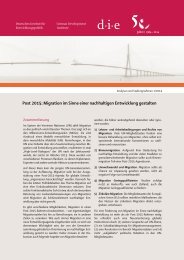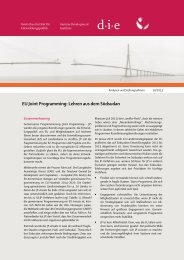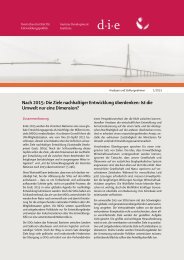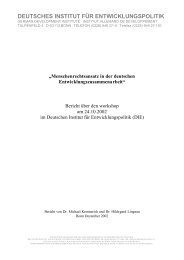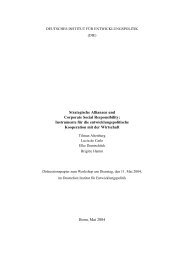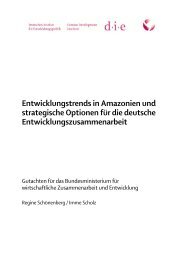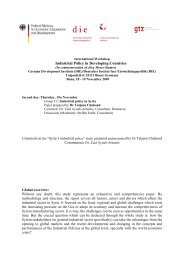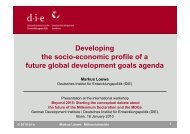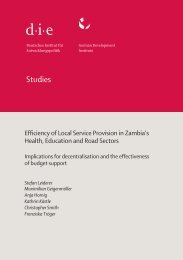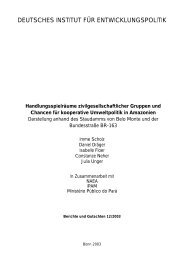Middle East / North Africa and the Millennium Development Goals ...
Middle East / North Africa and the Millennium Development Goals ...
Middle East / North Africa and the Millennium Development Goals ...
You also want an ePaper? Increase the reach of your titles
YUMPU automatically turns print PDFs into web optimized ePapers that Google loves.
64<br />
Markus Loewe<br />
Box 1: Discrimination against women in <strong>the</strong> civil-status codes of<br />
Arab countries<br />
Women’s rights when <strong>the</strong>y marry<br />
Only <strong>the</strong> Hanafi school of Islamic law permits women to decide autonomously<br />
on marriage. In <strong>the</strong> MENA region, it is only Moroccan law that largely reflects<br />
this doctrine. In o<strong>the</strong>r Arab countries, women are in need of a male guardian to<br />
marry. As a rule, this will be <strong>the</strong> fa<strong>the</strong>r or a bro<strong>the</strong>r, o<strong>the</strong>rwise <strong>the</strong> closest male<br />
relation in patrilinear succession. Women who have been married <strong>and</strong> divorced<br />
are in some cases allowed to remarry without a guardian. In many countries<br />
consent of a male guardian has become a formality that can be bypassed by<br />
having a court appoint a ‘formal guardian.’ Still, it is important not to underestimate<br />
<strong>the</strong> consequences that this guardianship arrangement <strong>and</strong> <strong>the</strong> social constraints<br />
it entails may have on women’s actual freedom of choice in entering in<br />
marriage. Only in Yemen is marriage concluded not by a women but by a<br />
guardian acting in her name.<br />
But in some countries under-age women can be married off by <strong>the</strong>ir guardian<br />
even against <strong>the</strong>ir will, indeed sometimes even without <strong>the</strong>ir knowledge. The<br />
reason for this is that <strong>the</strong> age of marriageability for women is for <strong>the</strong> most part<br />
lower than it is for men; in Tunisia <strong>and</strong> Syria, for example, women are considered<br />
legally marriageable when <strong>the</strong>y have reached <strong>the</strong> age of 17 <strong>and</strong> 16 years,<br />
respectively, while in both countries <strong>the</strong> age for men is 20 years. But in all such<br />
countries <strong>the</strong> legal age of majority <strong>and</strong> criminal responsibility is 18 years. In<br />
Yemen, <strong>the</strong>re is no minimum age for women to marry, <strong>and</strong> only <strong>the</strong> consummation<br />
of marriage (15 years of age) is regulated by law.<br />
Only in Tunisia is polygamy prohibited by law, whereas in Morocco it is conditioned<br />
explicitly on <strong>the</strong> approval of a judge <strong>and</strong> <strong>the</strong> consent of <strong>the</strong> first wife. In<br />
all Arab countries women have <strong>the</strong> right to dem<strong>and</strong> a marriage contract that lays<br />
down in detail <strong>the</strong> marital rights <strong>and</strong> obligations of husb<strong>and</strong> <strong>and</strong> wife <strong>and</strong> may<br />
e.g. exclude <strong>the</strong> husb<strong>and</strong>’s option to marry ano<strong>the</strong>r women. But in practice very<br />
few women make use of this option. Moreover, a marriage contract does not in<br />
effect permit a wife to prevent her husb<strong>and</strong> from marrying a second wife. If <strong>the</strong><br />
contract is broken by <strong>the</strong> husb<strong>and</strong>, <strong>the</strong> wife is only entitled to petition a divorce<br />
court to have her marriage dissolved.<br />
Women’s marital rights<br />
A woman’s marital rights include an absolute right to support by her husb<strong>and</strong>,<br />
while <strong>the</strong> husb<strong>and</strong> has a right to dem<strong>and</strong> obedience from his wife. In some Arab<br />
countries this explicitly includes a husb<strong>and</strong>’s comprehensive <strong>and</strong> exclusive sexual<br />
rights vis-à-vis his wife. In Tunisia <strong>and</strong> Morocco <strong>the</strong>re is no legal provision<br />
German <strong>Development</strong> Institute



